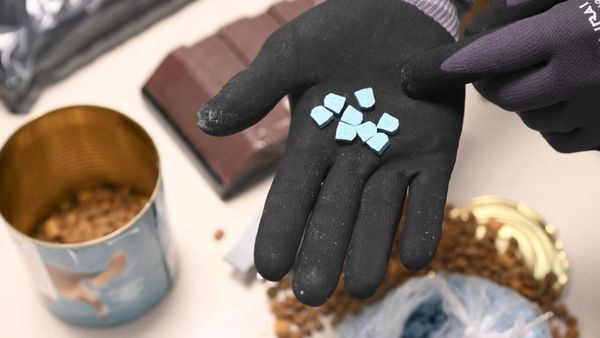
I spent three weeks visiting prisons across Scandinavia to find out how they feed their prisoners. You may ask why any of us should be concerned with what people in prison eat. But research suggests that good nutrition not only improves wellbeing, security and safety in prisons, it may have an effect on rehabilitation and keep people from returning to prison.
So does a region with one of the lowest reoffending rates in the world – only about 30% of Nordic prisoners end up back inside within two years – and a humane approach to incarceration treat prison food differently from countries with higher recidivism and a more punitive culture? As the founder of a charity dedicated to improving prison food in the UK, I wanted to find out.
In Denmark, I spent two days in Storstrøm prison, a high-security male establishment. Here, 65% of the prisoners cook all of their meals themselves, in kitchens they share with about six others. They plan meals and budget together, and twice a week they shop for ingredients in the prison’s in-house grocery store. They dine together, often with the on-duty prison officers. The less confident cooks in the housing unit quickly learn vital kitchen skills from their peers. One prisoner told me he had been able to “live healthily and eat clean” here. “I eat well, cook for myself, work out and spend time outside. I can keep in touch with my family and I’m able to bake my kids cakes for when they visit. I feel as though I’m in the best possible position I could be to come back out.”
In Storstrøm’s prison kitchen, the catering manager leads a team of staff and prisoners who produce meals for everyone in the establishment. He enrols every prison kitchen worker in a four-year culinary diploma. At the end of it, they will be trained to the same level of qualification as he is. I watched as they prepared homemade Greek meatballs with couscous and feta with care and attention to detail. The kitchen’s in-house nutritionist is required, by Danish law, to measure the nutritional breakdown of each dish and display it to prisoners.
It’s a far cry from the UK, where a rat-infested prison kitchen and a food poisoning incident that left six people seriously ill in hospital recently hit the headlines.
At Sulkava prison in Finland, I stood on the edge of a lake where, in the summer, prisoners fished for their dinner and foraged in the woodland for mushrooms and lingonberries. “Being here and able to cook for myself brings me a sense of normality, dignity and self-sufficiency,” one prisoner told me. At Suomenlinna prison off the coast of Helsinki, I stood in the dining hall watching men line up at the salad bar and help themselves to fresh rye bread.
In contrast, prisoners in the UK routinely eat unhealthy, processed, tasteless food, sometimes alone in their cell, often next to their toilet.
A smaller prison population and more public money puts Nordic prisons at an obvious advantage. In England and Wales, the daily budget for prison food is just £2.70 per prisoner.
But some of what I observed in Scandinavia I have seen in British prison kitchens too. A prison in Brixton, London, makes every plate of food from scratch. Homemade spice rubs, marinades and curry sauces enhance the poor quality meat and pack it with flavour. Prisoners make their own pastry, turning it into quiches and pies. Inspiring leadership and a commitment to making every plate of food as healthy, delicious and appetising as it can be within the limitations of prison catering set it apart from the rest.
The charity I founded teaches prisoners in England and Wales to cook and grow food, and trains catering teams to produce healthy meals. But prisons like HMP Brixton are still the exception.
Every day, our prisoners are eating poor quality food that is degrading their health and wellbeing at exactly the time they need it to improve. They are leaving prison in poorer health than when they entered, making recovery and rehabilitation difficult, and for many impossible. Some have simply forgotten how to do the things we take for granted: how to eat around a table, after months of eating alone, or how to cook, after surviving on pre-made, pre-selected prison meals, and sometimes noodles boiled in a travel kettle. For a few, such as Mohammed Azizi, the consequences of a prolonged prison diet are much more extreme.
In April, an inquest into his death while serving time at HMP Norwich heard how he had “repeatedly claimed that prison food was making his Crohn’s disease symptoms worse”. Along with Crohn’s disease and self-neglect, malnutrition was recorded as a cause of death.
Prison catering teams need to be inspired, upskilled and empowered to make good quality food. Prison grounds need to be utilised more to grow food. New prisons need to be designed featuring self-catering facilities, and existing establishments should be given the resources to introduce them. At Manchester prison, we’re about to start a cooking course in new kitchenette facilities. This shows that even in the country’s oldest Victorian prisons, a different approach is possible.
Better quality food in prison has the potential to reduce violence, improve mental health and reduce reoffending. A study by Think Through Nutrition at a young offenders institution in Aylesbury found that nutritional supplements reduced disciplinary incidents by 37%.
With the prison population in England and Wales projected to reach 114,800 by 2028, the UK urgently needs to rethink how and why we lock people up. Better quality food needs to be part of that solution.
In Scandinavia, I saw a prison system that successfully prioritises the wellbeing of prisoners through opportunities to cook, eat and learn about nutritious food. It is rooted in the principles of respect, rehabilitation and equality. Perhaps respect is a good place to start.
Lucy Vincent is the founder and chief executive of Food Behind Bars







